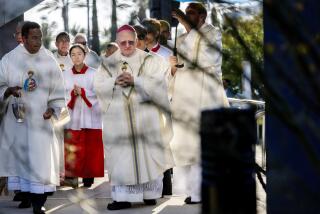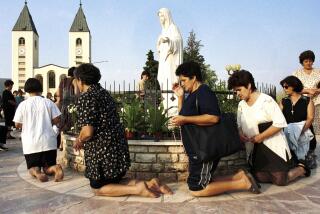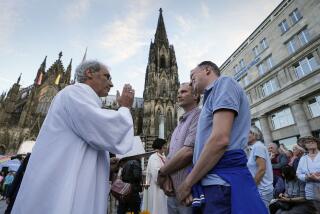Dissent in the Church: 2 Views on Vatican Instruction : PRO: It’s a helpful word about the faith uniting bishops, theologians.
- Share via
My task, in this preliminary reflection, is to affirm some positive contributions and to suggest some areas for development.
The instruction accentuates theology’s importance for the official expression of church teaching and frames its observations within the quest for truth. This quest is a communal enterprise. But the instruction notes a crucial difference between the roles of the theologian and the bishop.
Theologians are charged with exploring the “reasons of faith.” To quote the well-known phrase of St. Anselm, theology is “faith seeking understanding.”
The instruction clearly affirms the need for freedom to pursue research and scholarship. And the theologian must exercise an appropriate critical function. This obligation, however, is distinguished from a “critical spirit born of feeling or prejudice.”
The pastoral role of the bishop, on the other hand, is described as one of “vigilance.” As stewards of the doctrines of the church, bishops exercise an official teaching role, called magisterium. The roles of bishop and theologian are different, but also complementary.
Clearly, the instruction does not envision a conflict in this relationship. Particularly noteworthy is the recognition that the collaboration between bishop and theologian is a partnership in the official teaching of the church.
On a personal note, my experience on the Los Angeles Archdiocese’s theological commission has been one of collaboration and mutual respect between theologians and bishops.
As far as possible, harmony is to be sought, but the instruction recognizes that even under the best of circumstances, “the possibility cannot be excluded that tensions may arise.” In addressing this possibility, the instruction appeals to a twofold principle: a “unity of truth” when the issue under consideration deals with an essential aspect of faith, and a “unity of charity” in less than essential matters when valid differences occur.
In addressing dissent, the instruction recognizes and affirms the dignity of individual conscience. It also appeals to the vital importance of a living, communal tradition in order to avoid fragmentation that stems from a privatized understanding of conscience.
The hard question, of course, is how to deal with dissent in a global village characterized by rapid forms of mass communication.
No longer is theological debate conducted by ordained specialists in Latin. The instruction acknowledges that proper procedures to adjudicate disputes must be in place, and implicitly recognizes that procedures “can be improved.” This should be explored further.
Another fruitful line of inquiry that should be pursued is the vocation of the theologian.
A vocation is the fruit of a journey of personal fidelity and commitment in service to the community of faith. Theologians exercise skills as faithful disciples, not independent entrepreneurs.
As the wise Lutheran church historian Martin Marty observes, an understanding of the respective vocations of bishops and theologians will help minimize polarization and conflict.
I would recommend that attention be given to developing a “theology of assent” to provide a proper context for assessing matters of dissent.
In my view, the instruction should be seen as a helpful word, and certainly not the last, in a continuing conversation about the faith that unites bishops and theologians.
McCarthy is academic dean and professor of moral theology at St. John’s Roman Catholic Seminary in Camarillo. He has been at St. John’s since August, 1983, and is a member of the Theological Commission for the Archdiocese of Los Angeles.
THE ISSUE How much can a Roman Catholic theologian disagree with the Pope? A recent instruction from the Vatican proclaimed that theologians have no right to dissent publicly from official church teachings, even those not considered infallible or based on divine revelation. The Times asked two Catholic theologians to present their differing views on the controversial issue. From time to time, those involved in religious issues will be asked to speak out on their ideas.


